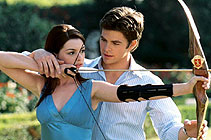|
|
|
|
The
Princess Diaries 2: Royal Engagement
|
 |
|
In 2004, mainstream cinema is bursting with strange, convoluted palpably self-conscious variations on old escapist formulae. Thunderbirds (2004) turns anti-terrorist policing into a boy's-own adventure and The Terminal (2004) makes political detention look like fun. This is doubtless because the weight of the reality that today calls forth such escapism is grimmer and less avoidable than ever. The territory of Genovia as portrayed in the Princess Diaries films is an escapist coup. It is a sunny, multicultural place frozen in aspic and seemingly free of every tension that bedevils the modern world. However, Genovia escapes the fate of most Utopias in the movies – those Brigadoons and Shangri-Las that are so impossibly perfect they inevitably turn into prisons or nightmares. Genovia is, in the most pleasant way possible, simply banal. It is full of clumsy servants, gossiping journalists, and occasionally slightly peeved citizens needing to save face – but never anything too dramatic or malicious, mind you. There are orphans needing a little care, but no social abuses or exploitation. There are social embarrassments, but no irreparable tragedies. A big deal in Genovia is constituted by a moment of gentle change-over – when Queen Clarisse (Julie Andrews) at last can hand her crown to the new-found heir, that blushing young city-girl Mia (Anne Hathaway). But there is a conservative and patriarchal rearguard – grumpy old guys who fall asleep during parliamentary meetings – which decrees that, in order to rule, Mia must first marry. This places her uncomfortably between two guys, Andrew (Callum Blue) and Nicholas (Chris Pine). I confess that, these days, I approach each new movie directed by Garry Marshall with trepidation and, most times, my fears are confirmed. Pretty Woman (1990) was fun, but since its success Marshall has been trotting out the same supposedly poignant clinches, pratfall gags and charming side-players (such as Hector Elizondo) with diminishing returns. Most of The Princess Diaries 2 is, as a result, flat as a pancake – its nadir represented by a twittery Heather Matarazzo who is Mia's best friend and apparently a "well-known political activist". But Hathaway's beaming charm does drag some energy into this otherwise dire project. Girl-power is staging a welcome return to popular movies (most spectacularly in Catwoman, 2004). When it comes to old-fashioned scenarios of romance – and nothing could be more old-fashioned than a 'royal engagement' – it takes some courage to push a notion of female autonomy into the foreground and keep it there. This is especially so in a time when our collective nostalgia for royal weddings can still make them front page news. The best aspect of Princess Diaries 2 – and the quality that somewhat saves it from tedium – is its willingness to explore a novel, having-it-both-ways option. What if it were possible to affirm that a modern girl can (and should) be independent, while still having that hunky guy on the sidelines, in reserve – a gentleman in waiting? Marshall's film at least takes us to a pleasing plateau in pop culture's reflection on this question. Whether the precarious balance it achieves will be scuttled in a Princess Diaries 3 remains to be seen. MORE Marshall: Raising Helen © Adrian Martin September 2004 |
![]()